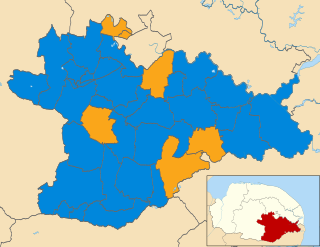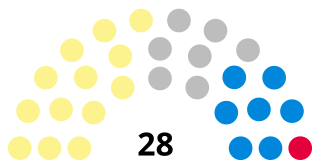
The 2004 Pendle Borough Council election took place on 10 June 2004 to elect members of Pendle Borough Council in Lancashire, England. One third of the council was up for election and the Liberal Democrats gained overall control of the council from no overall control.

The elections to South Norfolk District Council were held on Thursday 5 May 2011 along with various other local elections around England, elections to the Scottish Parliament, National Assembly of Wales and Northern Ireland Assembly, and a referendum on whether to adopt the Alternative Vote electoral system for elections to the House of Commons. All 46 council seats were up for election. The previous council was controlled by the Conservatives, with the Liberal Democrats being the only opposition.

Elections to Cannock Chase District Council took place on 3 May 2012 on the same day as other local elections in England. A total of 14 councillors were elected from 13 wards as a third of the council was up for election. This also included a by-election in the Hagley ward which filled a vacancy that had arisen since the previous election. There were no elections held in the Hednesford Green Heath or Rawnsley wards as those wards elect only two councillors in the other two years of the election cycle.

The 2014 St Albans City and District Council election took place on 22 May 2014 to elect members of St Albans District Council in Hertfordshire, England. One third of the council was up for election and the council stayed under no overall control.

Elections to Cannock Chase District Council took place on 22 May 2014 on the same day as other local elections in England and the European Parliament elections. A third of the council was up for election, meaning a total of 13 councillors were elected from all but two of the council's wards. There were no elections held in the Hagley or Hednesford South wards as those wards elect only two councillors in the other two years of the election cycle.

The 2014 Havant Borough Council election took place on 22 May 2014 to elect members of Havant Borough Council in Hampshire, England. One third of the council was up for election and the Conservative Party stayed in overall control of the council.

Elections to Cannock Chase District Council took place on 7 May 2015 on the same day as other local elections in England as well as a general election. A third of the council was up for election, meaning a total of 15 councillors were elected from all of the council's wards.

Elections to Cannock Chase District Council took place on 5 May 2016. This election was held on the same day as other local elections as well as Police and Crime Commissioner elections. A total of 13 councillors were elected from all but two of the council's wards as a third of the council was up for election.

The 2016 Exeter City Council election took place on 5 May 2016, to elect members of Exeter City Council in England. Following boundary changes, the entire council was up for election, and all 13 wards were contested, each electing three councillors. The election was held concurrently with other local elections held in England on the 5 May.

Elections to Cannock Chase District Council took place on 3 May 2018 on the same day as other local elections in England. A third of the council was up for election, meaning a total of 13 councillors were elected from all but two of the council's wards.

The 2011 South Oxfordshire District Council election was held on 5 May 2011 to elect members of South Oxfordshire District Council in England. This was on the same day as other local elections.

Elections to Cannock Chase District Council took place on 2 May 2019 on the same day as other local elections in England, including to several parish councils in the district. All of the council's wards were up for election, meaning a total of 15 councillors were elected.

Elections to Portsmouth City Council took place on Thursday 2 May 2019, alongside other local elections across the country. The seats contested in this election were last contested in 2015. The Conservative Party had 8 seats they were defending, the Liberal Democrats 5 and Labour 1 seat. A by-election occurred within the vacant Cosham seat from last years election, due to the sitting Conservative standing down. No party gained a majority from this election, and therefore the council remains under no overall control.

The 2019 Sunderland City Council election took place on 2 May 2019 to elect members of Sunderland City Council in England. The election took place on the same day as other local elections.

Elections to Cannock Chase District Council took place on 6 May 2021 on the same day as the Staffordshire County council election and other local elections in England. These elections were due to take place on 7 May 2020 but were delayed by 12 months due to the coronavirus pandemic. All but two of the council's wards were up for election, meaning a total of 13 councillors were elected.

The 2022 Calderdale Metropolitan Borough Council election took place on 5 May 2022 to elect members of Calderdale Metropolitan Borough Council in England. One third of councillors — 17 out of 51, plus one vacancy in Ovenden ward were up for election. The election took place alongside other local elections across the United Kingdom.

Elections to the City of Edinburgh Council took place on 5 May 2022 on the same day as the 31 other Scottish local government elections. As with other Scottish council elections, it was held using single transferable vote (STV) – a form of proportional representation – in which multiple candidates are elected in each ward and voters rank candidates in order of preference.

Elections to Angus Council took place on 5 May 2022, the same day as the 31 other Scottish local government elections. As with other Scottish council elections, it was held using single transferable vote (STV) – a form of proportional representation – in which multiple candidates are elected in each ward and voters rank candidates in order of preference.

Elections to Aberdeen City Council took place on 5 May 2022 on the same day as the 31 other Scottish local government elections. As with other Scottish council elections, it was held using single transferable vote (STV) – a form of proportional representation – in which multiple candidates are elected in each ward and voters rank candidates in order of preference.

Elections to Cannock Chase District Council took place on 5 May 2022 on the same day as other local elections in England, Scotland and Wales. All but two of the council's wards were up for election, meaning a total of 13 councillors were elected.




















